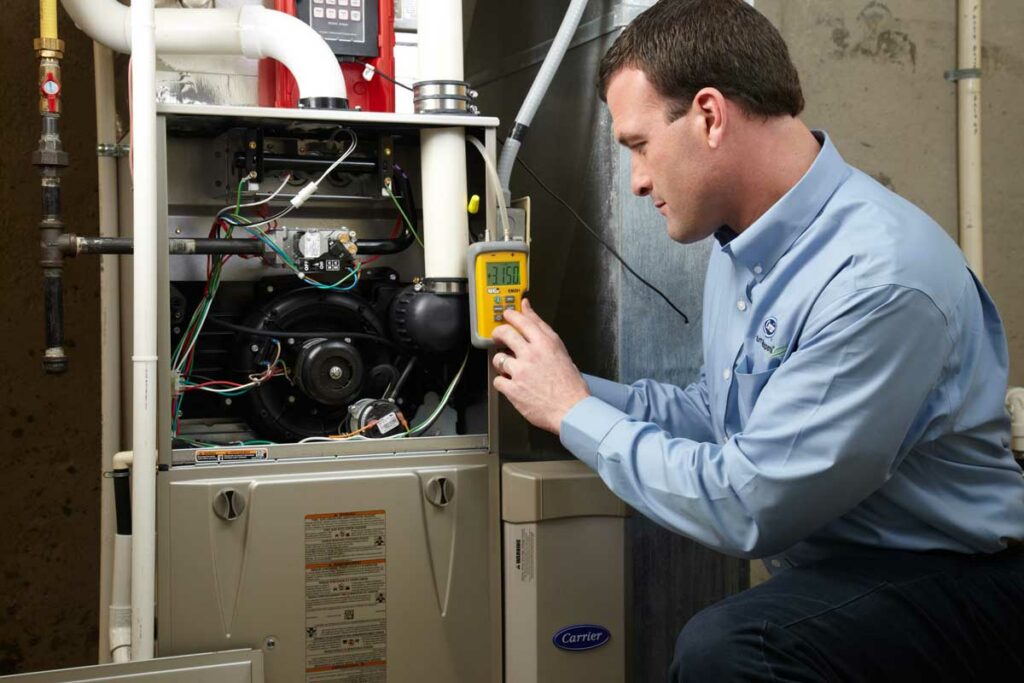Gas-powered furnaces offer heating power that is almost unmatched for residential comfort, and that makes them especially appealing in Colorado and our often tough, dry winters.
Although gas furnaces have a reputation as potentially hazardous, this is mostly unwarranted: contemporary gas furnaces are designed with numerous safety precautions, and if your furnace receives routine annual Denver furnace maintenance from a professional technician, you should have few worries. (We also recommend you set up carbon monoxide detectors in your house as a precaution, which is a service we can provide!)

One area of safety concern when it comes to gas furnaces is cracks developing along the heat exchangers. Should this occur, it calls for immediate professional furnace repair work to replace the exchanger.
Read on to learn more about heat exchangers, and if you have any questions, or think yours might be in need of a repair, call the Centennial and Denver heating experts at Bell Plumbing, Heating, Cooling & Electrical!
A heat exchanger is a metal chamber shaped like a clam. The exchanger’s role in a gas furnace is to collect the hot combustion gas from the burner and transfer the heat to its metal walls, where it then transfers to the current of air from the blower. This keeps fumes from the combustion gas away from the air that moves into the ventilation system. Once the combustion gas cools down, it vents out of the heat exchanger and safely up the exhaust flue and out of the house.
Cracked heat exchangers are usually suffered by furnaces that are 15 years older or older and/or haven’t received proper annual maintenance. By the time your furnace reaches that age, you should be thinking about replacement anyway, as a number of problems can start impacting the effectiveness and efficiency of your system.
Although gas furnaces do not use water, corrosion and rust can start in an aging furnace because of the natural reaction between metal and the combustion gas. When corrosion starts on a furnace, it is usually a sign that the furnace has aged past its usefulness and should be replaced.
But corrosion can start even on a newer furnace if there is a problem with proper exhaust venting. If corrosion begins on the exchanger, the weakening across the metal and the force of the exchanger expanding as it heats up will create cracks.
The best way to repair a cracked heat exchanger is to remove it and put in a new one. This doesn’t require replacing other components in the furnace. But it’s worth noting that it is an expensive repair, and often one that’s too expensive compared to having a new furnace installed.
A good rule of thumb is any repair job that will cost more than half that of a new furnace is probably a poor investment. You’ll save more money by upgrading to a new furnace.

A cracked heat exchanger will begin to leak combustion gas into the furnace cabinet. Although these cracks may appear tiny, they will start to gape wide as the exchanger expands during the intense heat of the heating cycle.
Leaking carbon monoxide is a serious danger, both from the explosive hazard and from its high toxicity. If you hear a clicking sound from your furnace right after the blower fan turns off, you may have a cracked heat exchanger.
If your carbon monoxide detector goes off, exit the house and call for help, as the source could also be a cracked heat exchanger. Any signs of corrosion on the furnace should also prompt a call to heating professionals. The furnace technicians will replace the heat exchanger if they discover it is cracked.
Any appliance that uses natural gas poses some risk of exposure to carbon monoxide, which is both combustible and toxic to inhale. Fortunately, gas furnaces today are designed with your safety as a priority, so you should experience few problems—as long as you provide the furnace with regular maintenance and have repairs done promptly!
Do you suspect you have a damaged heat exchanger? Bell Plumbing, Heating, Cooling & Electrical is ready whenever a hazardous issue like this starts. We offer 24-hour emergency service, so you don’t need to wait long to have your heater and your peace of mind restored. Call us today!
We’re ready to answer your questions or schedule your appointment, call now or book online!
